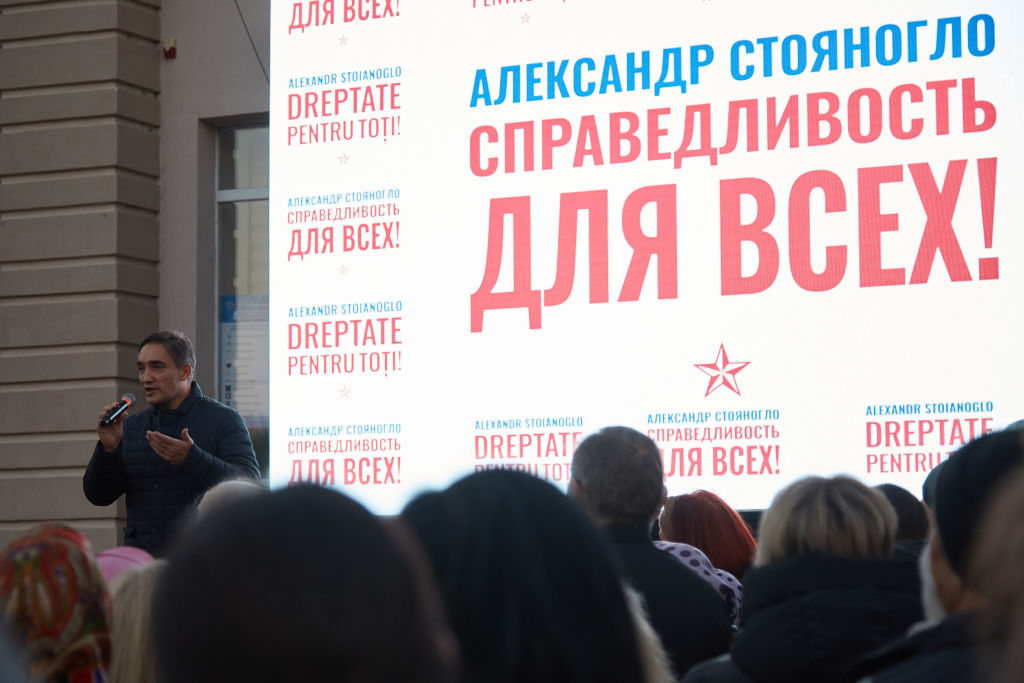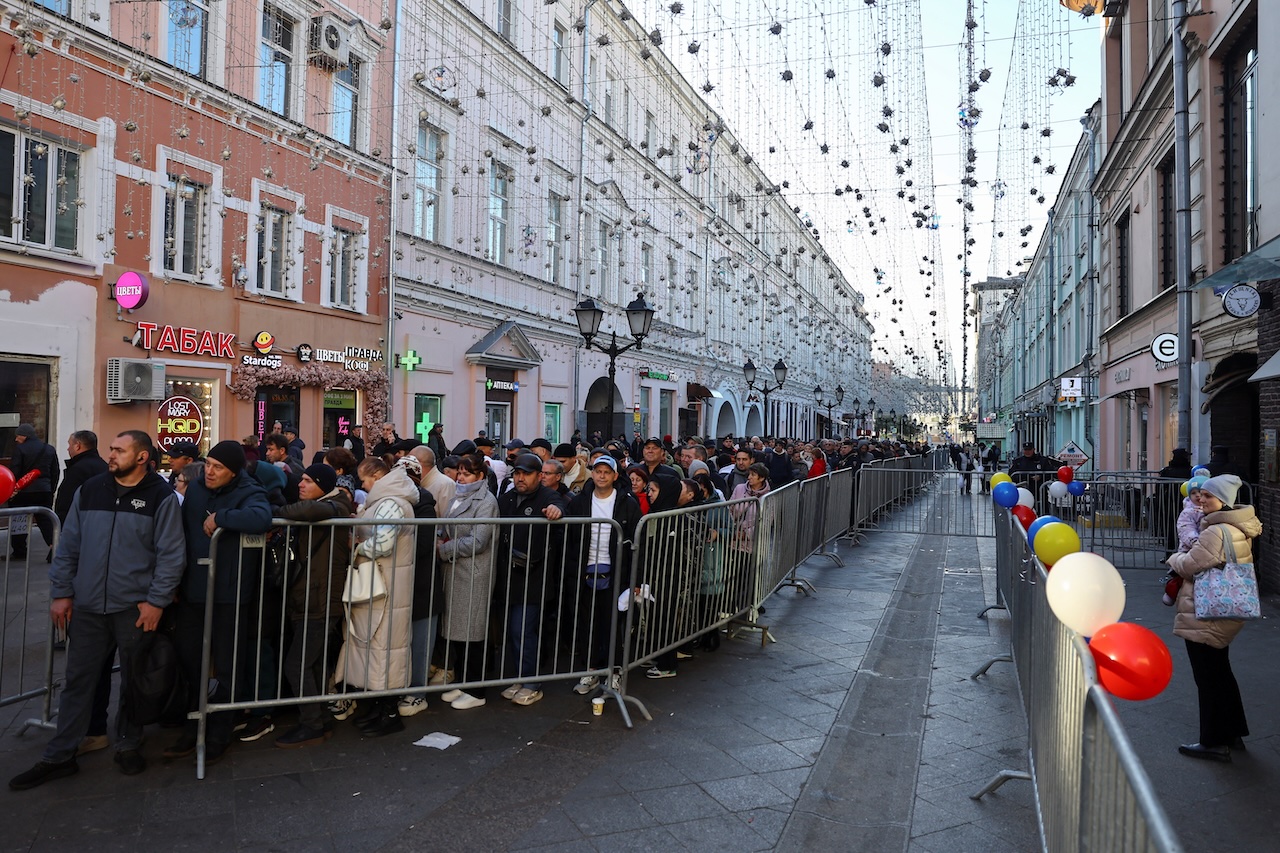Supporters and opponents of Moldova’s entry into the European Union (EU) are technically tied after the scrutiny of 98.29% of the votes cast in the referendum held on Sunday in this former Soviet republic.
The yes turned the result around during the last hours after the Moldovan president, Maia Sandu, denounced fraud last night in a clear accusation of groups close to Russia.
It is about a constitutional referendum boycotted by Russiawhich Moldova accuses of resorting to all kinds of tricks to frustrate the consultation. “I have voted so that Moldova can develop in peace and freedom,” said Sandu, after casting his ballot at a polling station in the capital, Chisinau.
In the middle of the morning, according to the Central Electoral Commission (CEC), 53.96% of Moldovans had voted against European integration and only 46.04% had opted for the ‘yes’ option, but in the final sprint things changed.
Whichever way the balance leans, the close result of this plebiscite shows the clear polarization of the former Soviet republic, divided between those who support joining the EU – Romanian speakers, youth and diaspora – and those who oppose the breakup. with Russia, Russian speakers, the nostalgic and the more adults.
The referendum coincided with the presidential elections, in which Maia Sandu has won, but not with an absolute majority, so she will have to face the Kremlin candidate, Alexandr Stoinanoglo, in the second round next month. The current president of Moldova has been the candidate with the most votes, with 38.8% of the support, she is ahead of her follower by just over ten points, who has presented herself with the acronym of the Party of Socialists of the Republic of Moldova ( PSRM), a formation led by the opposition Igor Dodon (president of the country from 2016 to 2020); which has obtained 28.3% of the votes. The former mayor of the city of Balti, Renato Usatti, came in third place with 13.7%, according to the preliminary results of the CEC, which correspond to 93% of the scrutiny.
Sandu denounces electoral fraud in the referendum
The president of Moldova, Maia Sandu, when the no vote still won, denounced electoral fraud, claiming to have “evidence and information that a criminal group intended to buy 300,000 votes. It is an unprecedented fraud whose objective is to compromise democracy. Its objective is sow fear and panic in society,” said the candidate for re-election in a very brief appearance.
“Criminal groups, associated with foreign forces, attacked our country with lies and propaganda (…) We will not stop defending freedom and democracy. We will wait for the definitive results and we will return with solutions,” added Sandu, who stressed that “today, Just like in recent months, freedom and democracy in Moldova have been the subject of an unparalleled attack,” according to the portal Newsmaker.
The president and candidate for re-election, Maia Sandu, casts her vote in the ballot box at a polling station in the Moldovan capital.
The president was referring to the Kremlin and the fugitive oligarch Ilon Shor, whom the Moldovan Prosecutor’s Office accused on the eve of the vote of creating a fraudulent scheme from Moscow to purchase some 130,000 votes with 15 million dollars deposited in Russian banks.
According to other sources, Russia would have dedicated 100 million dollars to boycott the referendum to include in the preamble of the Constitution the aspiration of Moldovans to integrate into the European bloc. Both the EU and the US have recently denounced a good number of attempts to destabilize the situation with a view to the vote.
The war in Ukraine silenced the European illusion
Moldova shares a border with Ukraine, so the war has had a great impact on the national economy due to the arrival of more than a million refugees, of which more than 120,000 are still in the country, according to UNHCR. Since Sandu came to power in 2020, the pandemic and the energy war with Russia, which triggered inflation, also contributed to the fall in living standards.
The Moldovan Government, which began accession negotiations in December 2023, received great support from Brussels on the eve of the vote with an aid package of 1.8 billion for the next three years. Moldova, one of the poorest countries in Europe, hoped to join the EU in 2030, where it already exports 65% of its products and where it receives more than 80% of direct investments.
Sandu managed to get Moldovans to turn out en masse to vote on Sunday, but not to support the European path, but to give him a punishment vote. The pro-Russian electorate, including that of Gagauzia autonomy – more than 95% against -, was much more vocal than voters in the capital, Chisinau, and emigrants – more than 70% in favor -, more inclined to entry into the European bloc.
Boycott of pro-Russian candidates

The Kremlin candidate, Alexandr Stoianoglo, at the closing of the presidential campaign.
Although both Stoianoglo, the former attorney general, and the third candidate in contention, Renato Usatii, proclaimed that they were not opposed to European integration, they ultimately boycotted the referendum, as did the Moldovan communists.
Stoianoglo argued that he did not vote in the popular consultation “as a sign of protest” against the inability of the authorities to explain the legal implications of the inclusion in the Preamble of the Constitution of the aspiration of Moldovans to join the EU.
Without mentioning it, both appealed to the vote of fear in reference to the fact that entry into the EU, which has helped Moldova to strengthen its Armed Forces in the face of the Russian threat, is a first step towards future accession to NATO.
Former President Igor Dodon, a close Kremlin ally whose party supported Stoianoglo, went further and openly called the referendum “illegal” and “unconstitutional.” “I voted for Moldova to return to normal. We need a leader who respects the Constitution, defends justice and is open to dialogue with both the West and the East,” said Dodon, who accused Sandu of dividing citizens into ” good” and “bad”.
Precisely, Russia was openly opposed to the referendum and, according to the Moldovan Prosecutor’s Office, the fugitive oligarch Ilon Shor tried from Moscow to buy the votes of 130,000 people with the transfer of 15 million dollars from Russian banks.
Dangerous second round for Sandu

Long queues at some of the polling stations in the capital of Moldova.
The No to the EU is a hard blow for Sandu, who could pay in the second round for the fiasco of the referendum, his decision to close numerous Russian television channels and his direct confrontation with the Kremlin for its campaign of hybrid attacks against Chisinau.
According to the CEC, in the absence of the final results being known, Sandu has more than 37% of the votes, while Stoinanoglu almost reaches 30%, well above what the polls gave him.
Stoianoglo, of Gagauzian origin, will surely gain the support of a large part of the pro-Russian electorate, although the good news for the current president is that Usatii will hardly ask for the vote for the socialist candidate, since he denounced that the Russian Government had pressured him with a new criminal case if he did not support his man in Chisinau.
In the past, Sandu opened an investigation against her adversary for his alleged links with the fugitive oligarchs wanted by Justice, but the European Court ruled in favor of the former prosecutor and he took revenge by challenging her at the polls.
Source: www.huffingtonpost.es


